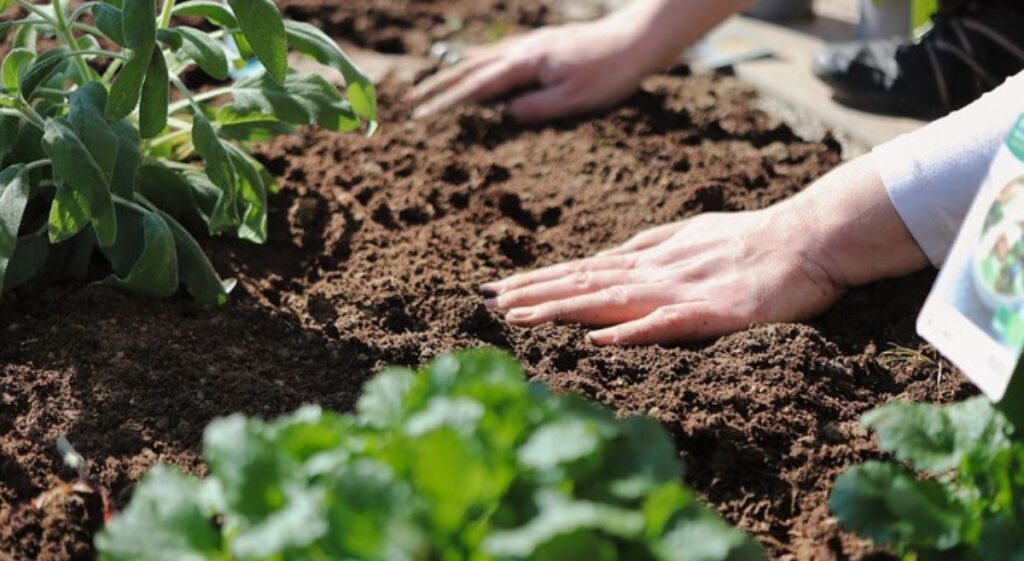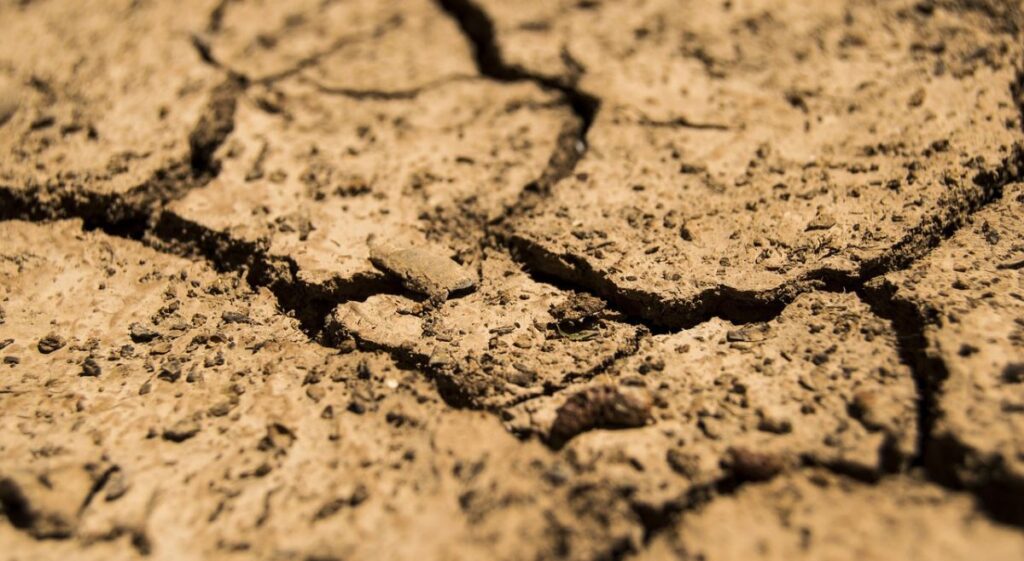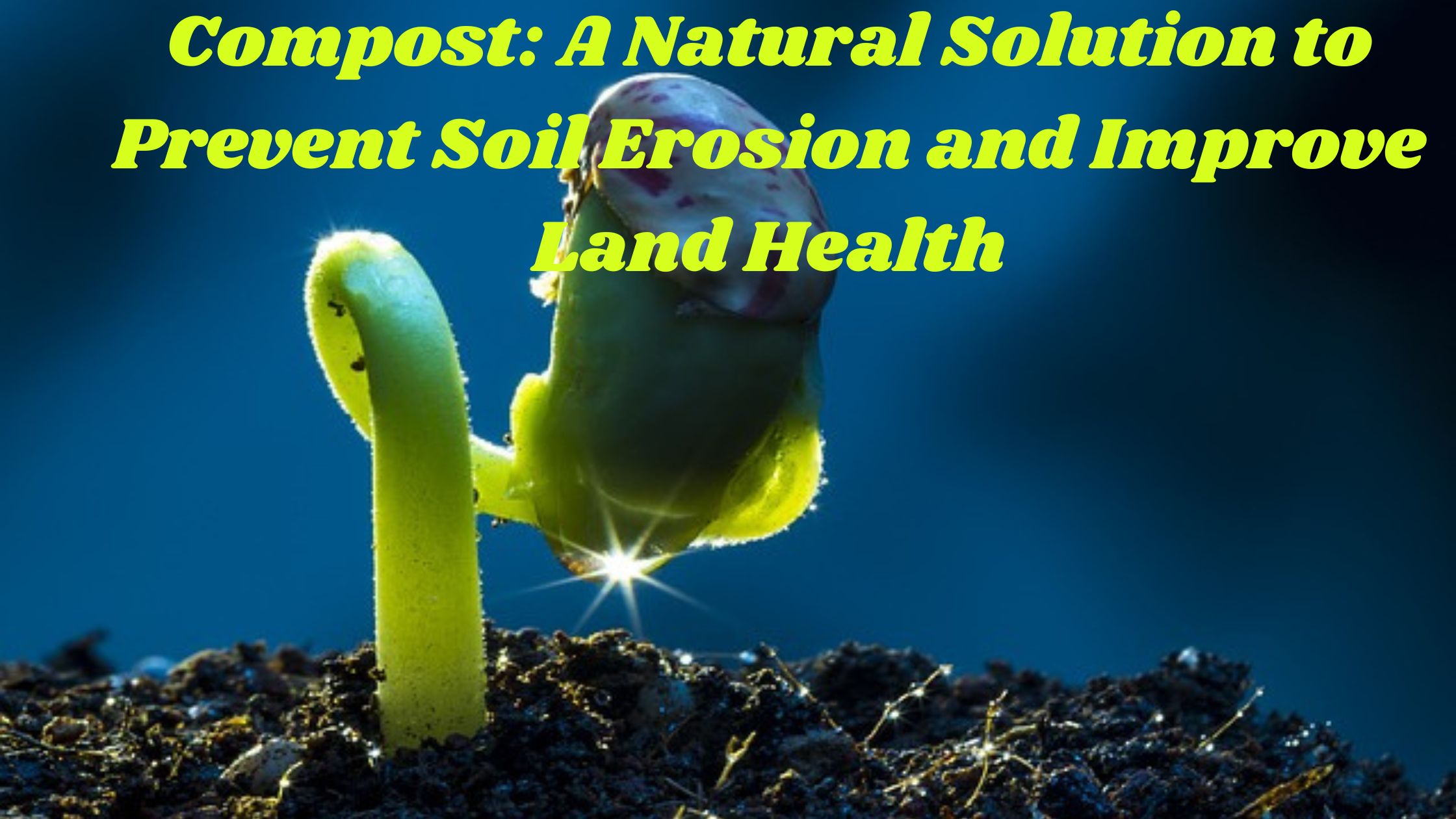Introduction
Compost: A Natural Solution to Prevent Soil Erosion and Improve Land Health

Soil erosion poses a significant obstacle for farmers, gardeners, and conservationists. It can result in the loss of fertile topsoil, diminished agricultural productivity, and damage to natural ecosystems. One of the most effective and environmentally friendly solutions to this issue is compost. By enhancing soil structure and fostering healthier land, compost acts as a natural barrier against erosion, protecting the soil from wind and water damage..
Comprehending the Phenomenon of Soil Erosion:
Understanding soil erosion involves delving into the intricate processes that shape the Earth’s surface. Soil erosion is a multifaceted phenomenon influenced by various environmental factors and human activities. By gaining insights into the causes and consequences of soil erosion, we can develop sustainable practices to mitigate its impact and preserve the integrity of our ecosystems.
Soil erosion, the wearing away of the top layer of soil rich in essential organic matter and nutrients, is caused by wind, water, or human activities. This process can trigger a series of adverse effects, such as reduced crop yields, increased sediment buildup in waterways, and the loss of critical habitats. Preventing soil erosion is paramount in preserving the vitality of agricultural lands and natural ecosystems.
How Compost Helps Prevent Soil Erosion
Compost, a remarkable tool in the fight against soil erosion, enhances the soil’s physical properties, making it more resistant to erosion. Here are the key mechanisms through which compost works.

- Improved Soil Structure: Compost promotes the formation of stable soil aggregates, clusters of soil particles bound together. These aggregates enhance the overall structure of the soil, making it less prone to erosion caused by wind or water.
- Enhanced Water Retention: Compost acts as a natural sponge, increasing the soil’s capacity to retain moisture. This moisture retention is critical in reducing runoff during heavy rainfall events. By preventing erosion, it also ensures a steady supply of water to plant roots, supporting healthy plant growth.
- Boosted Organic Matter: The organic matter in compost acts as a binding agent, holding soil particles together and reducing the risk of soil particles being washed or blown away. This binding effect is especially significant on sloped land, where erosion is more likely to occur.
- Support for Vegetation: Compost promotes robust plant growth by providing essential nutrients and improving soil conditions. Healthy plants, in turn, protect the soil with their extensive root systems, anchoring the soil in place, and further reducing the risk of erosion.
Improving Land Health with Compost
Rephrased and Reorganized Text:
Compost plays a crucial role beyond preventing erosion, as it contributes to the overall health and fertility of the land. Here are the key benefits of using compost:
- Nutrient Enrichment: Compost acts as a slow-release fertilizer, providing a steady supply of essential nutrients to plants over time. This sustained nourishment ensures that plants have the resources they need for healthy growth and development.
- Microbial Activity Enhancement: Compost introduces diverse microorganisms into the soil, promoting beneficial microbial activity. These microorganisms break down organic matter, release nutrients, and support plant health. A thriving microbial community is vital for maintaining soil fertility and resilience.
- Boosted Soil Fertility: By adding organic matter and vital nutrients to the soil, compost enhances soil fertility, making it ideal for agriculture and gardening. This enriched soil supports a wide range of plant growth, from crops to native vegetation.
- Increased Resilience Against Environmental Stressors: Compost improves the soil’s ability to withstand environmental challenges such as drought, extreme temperatures, and pest infestations. Healthier soil and plants are more resilient to these stressors, contributing to long-term sustainability.
By incorporating compost into the land, we can reap the benefits of improved soil health, enhanced plant growth, increased biodiversity, and more resilient ecosystems.
Practical Tips for Using Compost to Prevent Erosion
- Regular Compost Application: To reap maximum benefits, consistently apply compost to the soil. Prioritize erosion-prone areas like slopes and bare patches for erosion control.
- Incorporate Compost into the Topsoil: For optimal results, mix compost into the top few inches of soil. This strengthens the soil structure and enhances water retention.
- Mulch with Compost: Apply a layer of compost as mulch around plants. In addition to adding nutrients to the soil, this protective cover minimizes the impact of raindrops, further preventing erosion.
- Combine Compost with Other Erosion Control Measures: While highly effective, combining compost with other erosion control methods like planting cover crops or using erosion control blankets can provide even greater protection.
What are the environmental benefits of using compost in land management?
Environmental Advantages of Incorporating Compost into Land Management

Composting in land management offers numerous environmental benefits that contribute to a sustainable and healthy planet. Here are the key advantages of utilizing compost..
1. Waste Reduction and Climate Mitigation:
- Composting diverts organic waste from landfills, preventing methane production, a potent greenhouse gas.
- Reduced organic waste lowers methane emissions, mitigating climate change.
2. Enhanced Soil Health:
- Compost adds organic matter, improving soil structure, fertility, and water retention.
- Healthy soils are more resilient to erosion, drought, and environmental stresses.
- Reduced reliance on chemical inputs supports sustainable agriculture.
3. Improved Water Retention and Conservation:
- Compost-enriched soils retain water efficiently, reducing irrigation needs.
- Water conservation benefits arid and drought-prone regions, promoting plant survival and reducing runoff pollution.
4. Erosion Control:
- Compost binds soil particles, minimizing erosion caused by wind and water.
- Preserves valuable topsoil, which is crucial for plant growth and ecosystem balance.
- Reduced erosion prevents sedimentation in water bodies, protecting aquatic habitats.
5. Decreased Chemical Fertilizer Use:
- Compost provides a natural source of nutrients, reducing the need for synthetic fertilizers.
- Minimizes nutrient runoff, which can cause algal blooms and dead zones in aquatic ecosystems.
6. Biodiversity Support:
- Nutrient-rich compost creates a hospitable environment for a wide range of plants, microorganisms, and animals.
- Biodiverse ecosystems are more resilient to environmental changes and provide essential services like pollination and carbon sequestration.
7. Carbon Sequestration and Climate Regulation:
- Composting increases soil organic matter, which stores carbon and reduces atmospheric carbon dioxide levels.
- Improved soil health and productivity are additional benefits.
8. Soil Contamination Remediation:
- Compost can remediate contaminated soils by binding heavy metals and pollutants, reducing their impact on the environment.
- A valuable tool in land reclamation and pollution mitigation efforts.
9. Sustainable Agriculture Promotion:
- Compost supports sustainable agricultural practices by improving soil health and reducing the need for chemical inputs.
- Sustainable agriculture benefits the environment and ensures food security.
10. Greenhouse Gas Emission Reduction:
- Composting lowers greenhouse gas emissions by decreasing energy-intensive chemical fertilizer production.
- Enhanced soil carbon sequestration further contributes to climate change mitigation.
Incorporating compost into land management offers a range of environmental advantages that promote sustainability. By adopting composting practices, we contribute to a healthier planet, resilient ecosystems, and the preservation of natural resources for future generations.
Conclusion
In the realm of soil stewardship, compost emerges as a natural and lasting answer to the pressing issue of soil erosion. Through its ability to enhance soil structure, amplify water retention, and enrich the soil with organic matter, compost acts as a guardian of our land, shielding it from erosion and fostering healthier ecosystems. Regardless of your agricultural role, be it as a farmer, gardener, or conservationist, incorporating compost into your soil management strategies is a potent means to enhance land health and ensure long-term sustainability.
References
- USDA Natural Resources Conservation Service. (2023). The Benefits of Composting for Soil Health. Retrieved from https://www.nrcs.usda.gov/
- Soil Science Society of America. (2023). Soil Erosion and Conservation. Retrieved from https://www.soils.org/
- Cornell Waste Management Institute. (2022). Compost Use for Improved Soil Quality. Retrieved from http://compost.css.cornell.edu/
- University of California Agriculture and Natural Resources. (2023). Compost and Soil Health: A Practical Guide. Retrieved from https://ucanr.edu/
